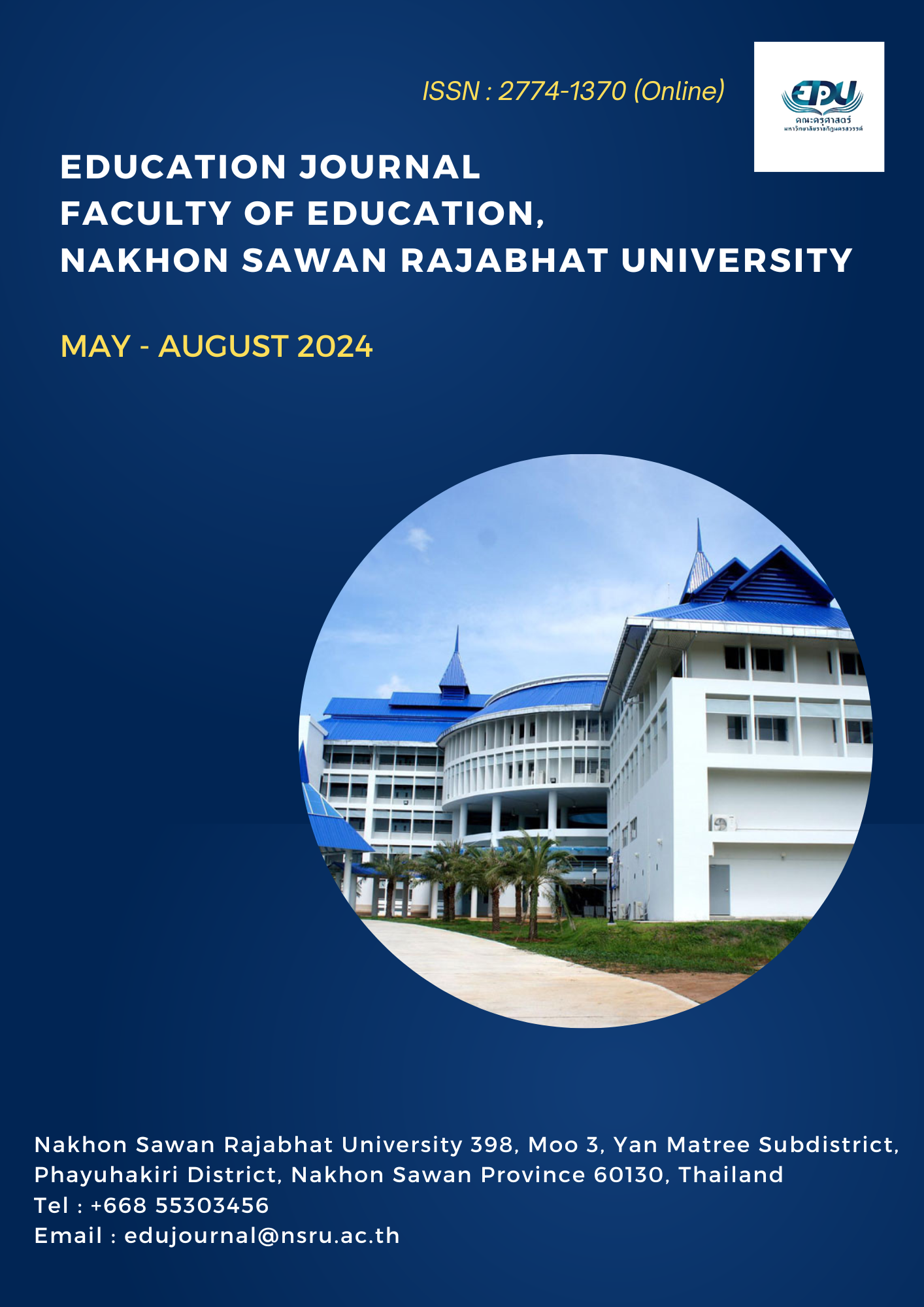Online Learning Management with SMILES Model to Increase Efficiency and Happiness in the New Normal Era of Undergraduate Students, Rajamangala University of Technology Thanyaburi
Main Article Content
Abstract
This research aims to 1) study opinions of online learning management using the SMILES model 2) study the effectiveness and happiness in online learning management using the SMILES model, and 3)study the factors affecting the effectiveness and happiness in online learning management using the SMILES model in the new normal of undergraduate students. This is a quantitative research study. The sample group used in the study consisted of undergraduate students was 400 students who registered for the first semester of the academic year 2023 in the General Education course of the Faculty of Liberal Arts, Rajamangala University of Technology Thanyaburi. The Research instruments was questionnaire with a reliability of 0.993. The statistical analysis used included frequency, percentage, mean, standard deviation, Pearson's correlation coefficient, and multiple regression analysis. The research results were found as follows;
1) For the overall opinion, students agree to online learning management using the SMILES model was high , with the highest average being that evaluation. 2) The effectiveness of online learning management using the SMILES model is high, with the highest average being that students are able to adapt to the new way of life learning. In terms of happiness, it was found that students are very happy, with the highest average being that they feel happy when they are able to review lessons at any time, and 3) The factors affecting effectiveness include Sprightly, Learning activities, and Motivation. The factors affecting happiness include Evaluation, Motivation, Strategies, and Learning activities.
Downloads
Article Details

This work is licensed under a Creative Commons Attribution-NonCommercial-NoDerivatives 4.0 International License.
References
กัลยา สว่างคง. (2564). การเรียนยุค “New normal” เปิดพื้นที่สร้าง “Passion” เรียนรู้ตลอดชีวิต. สืบค้นเมื่อ 18 พฤศจิกายน 2566, จาก https://www.bangkokbiznews.com/social/948474.
กาญจนา บุญภักดิ์. (2563). การจัดการเรียนรู้ยุค New Normal. วารสารครุศาสตร์อุตสาหกรรม. 19(2 : A1–A6.
จันทนา วัฒนกาญจนะ, แพรวพรรณ ตรีชั้น, ธนาธิป พัวพรพงษ์, และวิศิษฐ์ ฤทธิบุญไชย. (2564). ประสิทธิภาพของการเรียนออนไลน์ จากสมรรถนะผู้สอนและการวัดประเมินผล กรณีศึกษาคณะวิทยาการจัดการ มหาวิทยาลัยราชภัฏนครปฐม. วารสารวิชาการสังคมศาสตร์เครือข่ายวิจัยประชาชื่น. 3(2): 1-13.
บดินทร์ ชาตะเวที. (2563). พฤติกรรม กับ ชีวิตวิถีใหม่ : New Normal. สืบค้นเมื่อ 18 พฤศจิกายน 2566, จาก https://www.ttmed.psu.ac.th/th/blog/258.
บุญเลี้ยง ทุมทอง, และประทวม วันนิจ. (2565). ผลกระทบจากสถานการณ์โควิดที่มีต่อการจัดการศึกษาไทย: การศึกษาทางเลือก คือทางหลักและทางรอดในการจัดระบบการศึกษาไทยในอนาคต. วารสารวิชาการธรรมทรรศน์. 22(4): 375-391.
พนัส จันทร์ศรีทอง. (2565). ชีวิตวิถีถัดไปกับการศึกษา. วารสารครุศาสตร์ คณะครุศาสตร์ มหาวิทยาลัยราชภัฏนครสวรรค์.5(3): 25-36.
พัชราภรณ์ ดวงชื่น. (2563). การบริหารจัดการศึกษารับความปกติใหม่หลังวิกฤตโควิด-19. วารสารศิลปะการจัดการ. 4(3): 783-795.
เพ็ญพักตร นภากุล. (2566). พฤติกรรมการเรียนและสภาพปัญหาการเรียนด้วยระบบออนไลน์ของนักศึกษาคณะครุศาสตร์ มหาวิทยาลัยราชภัฏสงขลา. ในการประชุมวิชาการระดับชาติ มอบ.วิจัย ครั้งที่ 17 การวิจัยและนวัตกรรมภายใต้การเปลี่ยนแปลงของโลก (Research and Innovation in a Changing World) ระหว่างวันที่ 20 - 21 กรกฎาคม 2566, หน้า 283-293. อุบลราชธานี: มหาวิทยาลัยอุบลราชธานี.
ไพฑูรย์ โพธิสาร, นีรนาท จุลเนียม, และเอก เกิดเต็มภูมิ. (2565). การพัฒนารูปแบบการจัดการเรียนรู้แบบ Active Learning ระบบเครือข่ายสังคมออนไลน์ ในยุค New Normal covid-19 เพื่อส่งเสริมความคิดสร้างสรรค์ของผู้เรียนระดับอุดมศึกษา. วารสาร “ศึึกษาศาสตร์์ มมร” คณะศึึกษาศาสตร์์ มหาวิิทยาลััยมหามกุุฏราชวิิทยาลััย. 10(1): 275-292.
มาลีวัล เลิศสาครศิริ, จุรีย์ นฤมิตเลิศ, และกิติยา สมุทรประดิษฐ์. (2564). ปัจจัยที่มีผลต่อพฤติกรรมการเรียนผ่านระบบออนไลน์ของนักศึกษาวิทยาลัยเซนต์หลุยส์ จากสถานการณ์โควิด-19. วารสารสุขภาพกับการจัดการสุขภาพ. 7(1): 13-27.
วิชัย วงศ์ใหญ่, และมารุต พัฒผล. (2563). การออกแบบการเรียนรู้ใน New Normal. กรุงเทพฯ: มหาวิทยาลัยศรีนครินทรวิโรฒ.
สิทธิพร เอี่ยมเสน, พันพัชร ปิ่นจินดา, จิระ จิตสุภา, และเบญจวรรณ กี่สุขพันธ์. (2564). แนวทางการจัดการเรียนรู้ออนไลน์เพื่อความสุขในการเรียนรู้ของผู้เรียนระดับมหาวิทยาลัย. วารสารศึกษาศาสตร์ มหาวิทยาลัยสงขลานครินทร์ วิทยาเขตปัตตานี. 32(3): 1-16.
สุขุมา อรุณจิต. (2566). การสังเคราะห์ปัจจัยที่ส่งผลต่อการเรียนออนไลน์. วารสารธรรมศาสตร์. 42(1): 203-220.
สุพรรณี บุญหนัก, บันทะชัย ภูพิมทอง, จิณณวัตร แทนพันธ์, ประภาส ลาวัณย์ศิริ, และสุขพัฒน์ อนนท์จารย์. (2564). รูปแบบการพัฒนาการจัดการเรียนรู้ออนไลน์ของมหาวิทยาลัยมหามกุฏราชวิทยาลัย วิทยาเขตศรีล้านช้าง. วารสารศรีล้านช้างปริทรรศน์. 7(2): 53-70.
สุพิชญาณ์ แก้วโพนทอง, และปชาบดี แย้มสุนทร. (2564). กระบวนการการจัดการเรียนรู้ออนไลน์ในช่วงวิกฤติ Covid-19 ของสถาบันการศึกษาระดับอุดมศึกษาในจังหวัดจันทบุรี. วารสารบัณฑิตศึกษามหาจุฬาขอนแก่น. 8(3): 175-186.
สุภาภรณ์ พรหมบุตร. (2563). New normal กับวิถีชีวิตที่เปลี่ยนแปลง. สืบค้นเมื่อ 10 พฤษภาคม 2565, จาก https://dsp.dip.go.th/th/category/2017-11-27-08-04-02/2020-06-29-14-39-49.
อลงกรณ์ เกิดเนตร, ประภาวรรณ สมุทรเผ่าจินดา, และพันพัชร ปิ่นจินดา. (2564). การจัดการชั้นเรียนออนไลน์ด้วยรูปแบบ SMILES เพื่อส่งเสริมการเรียนรู้ชีวิตวิถีใหม่ในยุคเปลี่ยนผ่านการศึกษาด้วยเทคโนโลยีดิจิทัล. วารสารปัญญาภิวัฒน์. 13(1): 294-307.
อุสรา อเนกปัญญากุล. (2563). ความสุขในการเรียนออนไลน์ช่วงระบาดโควิด-19 ของนักศึกษาปริญญาโท หลักสูตรบริหารธุรกิจมหาบัณฑิต มหาวิทยาลัยรามคำแหง. สืบค้นเมื่อ 18 สิงหาคม 2566, จาก https://mmm.ru.ac.th/ MMM/IS/sat17/6214060133.pdf.
Oops, M. (2020). COVID-19 Transforming Education Around the World! Using New Technology to Study-Thai University Teach through Online. Retrieved on May 10, 2022, from https://www.marketingoops.com/exclusive/business-case/covid-19-reinvent-global-educationsystem-with-educational-technology/.
Titan, Ferdianto, Desak, G. G. F. P., & Lena. (2017). A Comparative Study of Teaching Styles in Online Learning Environment. International Conference on Information Management and Technology 2017. pp.15-17. Special Region of Yogyakarta, Indonesia.
Yamane, T. (1973). Statistics: an introductory analysis. New York: Harper and Row.


